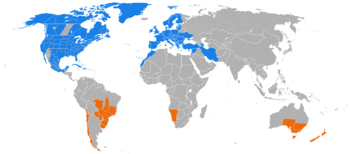Thursday, 15 September 2022
Simplicity
Sunday, 28 August 2022
The Clock
For a long time my natural instinct has been to use the 24 hour clock.
I was recently given an appointment at the dentist for a rather odd time 1435. [I erroneously said 1535 in the original post] However the receptionist said to me that the appointment was at "25 minutes to 3.'' Writing it in my diary and so as to keep it on the 12 hour clock I said "Right. That's it in at 2.35". "No" she responded "It's at 25 to 3". I immediately apologised and was just about to erase it and re-write it when it occurred to me that we were just misunderstanding each other's format for the same time. I laughed and, apologised, and asked if we could agree on 1435. Quick as a flash she responded with a smile "Oh heavens, I don't know. I've never managed to use decimalisation for time!".
That's not all though. 1230 can also be "half 12" as in "I'll meet you at half 12" ie at half (an hour) past midday.
In fact 'a quarter of an hour' 'half an hour' and 'three quarters of an hour" are still in common usage in the UK at least.
Sunday, 30 September 2018
Five Minutes
If you are waiting for the train or a bus in a downpour with no shelter it seems like an interminable age.
Of course all that translates, the necessary changes being made, to 5 weeks, months, years, decades and so on.
I'll leave you with the 'modern'* version of 'Time's Paces'
When I was a babe and wept and slept,
Time crept;
When I was a boy and laughed and talked,
Time walked.
Then when the years saw me a man,
Time ran.
But as I older grew,
Time flew.
Soon, as I journey on,
I'll find time gone.
May Christ have saved my soul, by then
Amen
* Guy Pentreath (1902–1985)
Friday, 26 July 2013
The Lost Art of Timekeeping - Part 1
I was pondering the other day on the marvel of the modern bus stop. The bus shelter had a display telling me where the next bus was going and when it would arrive at this stop (ie how long I was going to have to wait - as if I had an option). The possibilities of what information could be imparted and what we could do with it seemed, and indeed are, limitless.
Sunday, 28 October 2012
Daylight Saving Time
Tuesday, 24 May 2011
Writing
How long does it take you to write your average blog post? Or your average email? Or a letter? Or, indeed, anything. Of course there isn't really an answer to that question other than responding by asking 'How long is a piece of string?'. I've just written a post which has taken nearly two hours but that's not the whole story. I had to download the photos from my camera and my phone. I was, sort of, watching the TV News and making dinner too and in true ARADD fashion I managed to do (and not do) a number of other things as well.
To which post I was referring I have no idea but the principle holds true. Some people read and write speedily. Some do not. I'm one of the slow ones.I was thinking of the time it's taken because in a recent post, Terminology, on her blog, Katherine quoted, in context, “I didn't have time to write a short letter, so I wrote a long one instead.” It would appear that Mark Twain made the comment. Apparently, however, nothing is ever truly original because Blaise Pascal (French mathematician and physicist 1623 - 1662), in his "Lettres provinciales", letter 16, 1657 said "I have made this letter longer than usual, because I lack the time to make it short (Je n'ai fait celle-ci plus longue parceque je n'ai pas eu le loisir de la faire plus courte)".
The point of all that rambling is that I spent my career making sure that letters, cases, reports, legal documents, the words spoken by politicians (but written by their civil servants) etc were always clear, precise and, hopefully, open only to the interpretation (or in some cases interpretations!) that were desired.
So now that I am supposed to be writing more entertaining prose where, let's face it, no one really cares whether I have crossed the is and dotted the ts (er that doesn't sound quiterightcorrect does it?), I find it very hard to break old habits.
Saturday, 9 October 2010
Fine When They Work
Tuesday, 27 April 2010
I’m Back.
I do choose original titles don’t I?
I arrived back on the Island on Saturday afternoon to be met at the Airport by a long huge hug from Pat. At the risk of repeating myself (why should I suddenly worry about that?!) I can think of few things more calculated to make me feel alone and lonely than arriving at the airport with no-one to welcome me.
I am starting this post at 0723 on Tuesday 27 April. I’ve been up for quite a while after my first good night’s sleep since I set foot on Scottish soil. Although the *** nightmares (well they were only ponies I suppose) are back. Sibelius’s First Symphony is pounding out. There is a vibrant urgency in this symphony combining the last throws of the great Romantic Symphonies with a push into the music of the Twentieth Century (In which, I think, it was written. Having said that although Sibelius died in, again I think, 1957 he wrote little or nothing of consequence in the last 30 years of his life and I can’t recall how old he was when he died. I must go and look it all up – sometime.) Back to the vibrant urgency! That is how I have felt since I returned. There is so so much to be done. there always is, of course, but, whether it’s my imagination or I just have a short memory, I feel more than ever that there is so much to be done and so little time in which to do it. Which is odd if you think about it. Perhaps that’s one for A Life in The Day Of.
Then there are the silly things. Where do I keep the saucepans? (The same place I’ve kept them for the last 15 years since I built this kitchen!). Why have the saucepans moved around (Friends have been staying). In fact so much seems to have moved but, when I think about it, I realise that I moved quite a lot of things last summer and my recollection just hasn’t caught up. There are the missing things. Well, not actually, they are things I take for granted in one life and suddenly realise that I’m in the wrong life to find that particular thing.
By now it’s nearly midday.
I started making a list on Saturday evening. I was on the second A 4 page by Sunday. Now I’ve edited the three pages into lists: communicate, indoors, outdoors, plan. Then there’s the URGENT list. Then there’s the I can’t cope I’m going to have another coffee/pour a glass of wine response.
I spent much of Monday shopping and sorting things in Town (I even had my eyes tested). Today I decided I wasn’t leaving the house. Blogland beckoned. However, this morning was spent on the phone and ‘sorting’ problems. After two years I now have online access to my cell phone account! At one stage I was on the phone to New Zealand when my other phone rang with a call from New Zealand! I have made three appointments and ordered my prescriptions from the Docs.
Have you ever sat somewhere with a drip? The water sort! The roof of the Study is a double skinned polycarbonate lined internally with wood. Onto the lead flashing was falling a drip of water from the gutter about 2 feet above. It sounded, like, a hammer each time a drop fell. Despite the rain I got the ladder out and scaled the dizzy heights up to the gutter. It was blocked. Now it isn’t. Whilst the ladder was out I put up my wireless weather station. Oh yes. Things were getting done. Now for Blogland.
Why does this wireless keyboard and the previous one which it replaced (both being used here with Palin my laptop) keep missing out letters – and failing to register the shift key - whilst my wireless keyboard in New Zealand works perfectly? I think CJ has the same problem. Answers on a post card, please, to….
Right. I’m resolved. I shall now do some blog posts.
By the way. In case any of this sounded like a complaint please let me assure you that I’ve enjoyed every minute of the last 71 1/2 hours since I arrived back on the Island.
And, by the way, there are still some more posts to come on A Hebridean in New Zealand so please don’t abandon it yet.




